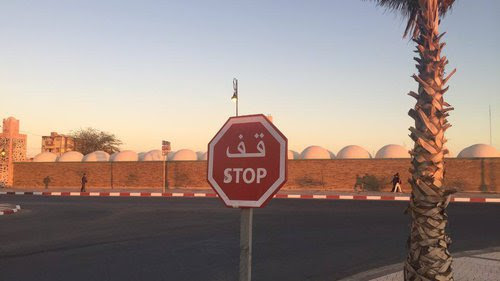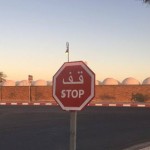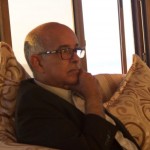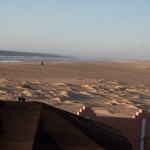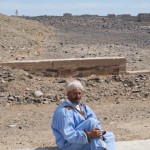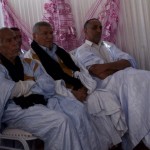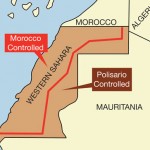Euractiv
By Sarantis Michalopoulos
1,000 Moroccans have joined ISIS.[Sarantis Michalopoulos]
Rabat has urged Europe to help stabilise North Africa, as ISIS steps up its efforts to recruit young Moroccans through social media.
As instability spreads across the Sahel and North Africa, Morocco’s borders have come under growing strain.
ISIS has extended its presence throughout the Maghreb, including to neighbouring Algeria. In Libya, entire areas are now under the direct control of the terrorist organisation.
Fighters from Islamic State have recently sought to regain ground lost to forces allied with Libya’s unity government in the jihadists’ coastal stronghold of Sirte. Government of National Accord (GNA) forces, backed by air strikes, entered the Mediterranean city last week, intending to drive the extremist group out of its bastion on Europe’s doorstep.
According to government officials in Rabat, Morocco is trying to play its part by stepping up efforts to keep ISIS out of the country.
Mohamed Cheikh Biadillah, former president of Morocco’s House of Councillors, told EurActiv.com that the Islamic State’s activities were not taking place in mosques but on the Internet.
Mohamed Cheikh Biadillah[Sarantis Michalopoulos]
“Daesh (ISIS) is trying to recruit many people. They have a kind of influence in social media and try to convince young people to get involved in this criminal organisation.”
Approximately 1,000 young Moroccans have gone to Syria to join ISIS, while 300 of them have already returned.
A high-ranking official told EurActiv that ISIS is currently approximately 350 kilometers away from Europe, ib the Libyan coast.
“If Morocco is destabilised, the distance will be 14 kilometers,” the official said.
Instability in the Western Sahara
According to Biadillah, the main problem was that Tindouf refugee camps in Algeria are close to the Western Sahara.
During the Western Sahara War in 1975-76, a number of Sahrawi refugees moved to Algeria, fleeing Moroccan forces. Almost 40 years later, there are still refugee camps where people live in difficult conditions. In addition, Sahrawi living there cannot return to their homeland and reunite with their families in Western Sahara.
“The geographical proximity combined with the fact that those people there have no future, makes it easy for Daesh to approach them,” the Moroccan official said, adding that radicalisation in Algeria has been escalating for years now, putting the whole region at risk.
Security cooperation between Morocco and the EU is remarkable, Biadillah said, particularly with France, Spain, and Belgium.
“I think the EU, as a partner, should help and support Morocco in its efforts to become a sole and stable country in the region,” he stated.
“Gatekeeper of Europe”
Referring to the refugees flows from other African countries trying to reach Europe, he said that Morocco was a transit country. “His Majesty the King Mohamed VI asked for a unique strategy for immigrants and refugees and the flows have come under control.”
“Those who have already come in the country, have their rights protected, there are free scholarships for all as well as healthcare, and labour market is open for them. They all have the same benefits like Moroccan citizens,” he noted.
There are guards protecting the coasts every 300 meters / View from the King’s summer residence in Layounne, Western Sahara.[Sarantis Michalopoulos]
“We try to guarantee the rights of these people but we should count on the EU’s support in this field.”
He also noted that projects like the Mediterranean Union should be revived in order for the region to face its “common destiny”, and added that the project was frozen due to the fact that it attempted to solve many issues at the same time.
Yahdih Bouchab, Wali (custodian / protector of the King) of Laayoune-Sakia El Hamra region, also said that refugee flows were notably reduced. “We are in tight cooperation with Canary Islands, Spain and the northern part of Morocco.”
Bouchab pointed out that in July 2008, a conference about migration and development was organised in Rabat, with the objective of drawing the attention of EU partners on the migration issue.
“Our message was that by helping both countries which are sources of immigration, and transit countries, migration flows can be reduced considerably […] Unfortunately, to date, there has been no serious policy going toward this direction.”
“Morocco is a good partner and it is also close to Europe. We are only 14 kilometers away. We have to think together and work hand-in-hand the way to face this situation,” he emphasised.
Life in Western Sahara
EurActiv visited Smara, a city in the Western Sahara with a population estimated at 42,056, and met with representatives of Saharawi tribes, as well as from civil society.
A Saharawi praying in the desert of Smara.[Sarantis Michalopoulos]
Lmehdi Bahdi is a professor of English living in Smara. He told EurActiv that everyday life was “normal” and that allegations about human rights violations were propaganda fuelled by Algeria.
“This is our homeland and we do believe that we are Moroccans […] We have no relations with Algeria. Of course they are neighbours, they are Muslims and Arabs, but there are refugees there [in Tindouf],” he said.
Representatives of Saharawi tribes.[Sarantis Michalopoulos]
“When the conflict started in 1975 the families were divided, there was a programme organised by the UN to meet each other. We call them on the phone. They cannot come back. It’s a difficult situation. They want to come to their homeland but they can’t.”
Polisario
However, not all Saharawi share the same view. Polisario is a Saharawi rebel national liberation movement whose aim is to end Moroccan presence in Western Sahara.
The Polisario Front proclaimed the Sahrawi Arab Democratic Republic (SADR) on 27 February 1976. SADR claims sovereignty over the entire territory of Western Sahara but in practice, it controls only about 20-25% of the territory, mainly to the east.
EurActiv also spoke with NGOs, which report on human rights abuses committed by Morocco in the Western Sahara.
A member of the Association of Victims of Grave Human Rights Violations Committed by the Moroccan State said that the local population needed to have a choice between autonomy, independence or integration, and that a referendum should take place.
“We are an NGO, we are reporting the abuses of human rights of people of Western Sahara, but at the same time we support their self-determination.”
“Since Morocco invaded in Western Sahara, it committed major violations, it was a war crime, a crime against the humanity […] still even now the rights of Sahrawians are violated, there is no freedom of expression, and we have no jobs,” the activist said, adding that Morocco is trying through settlements to change the demographic balance. “They [Moroccans] managed to do so, as now Saharawians are a minority.”
Asked about the NGOs relations with the Algerian authorities, the activist noted that Algerians are among the supporters of the Sahrawians. “We need to thank them because when Morocco invaded the only choice for Sahrawians was to flee to Algeria […] Thanks to Algerians we are now alive.”
Algeria “stuck” to Cold War
French Sociali MEP Gilles Pargneaux told EurActiv that the whole world is in disorder and Arab countries like Morocco face serious instability and the threat of Daesh.
“That is why partnership between the EU and Morocco needs to be strengthened as much as possible in order to help this country face this threat,” he noted.
Pargneaux continued, saying that the situation in Western Sahara is a reason why the EU needs to help Morocco stabilize. “The democratic process that has taken place so far cannot be compared to other Arab world countries. In addition, Morocco has the most efficient secret services that fight terrorism and Daesh.”
“By stabilizing Morocco we will help stabilize the Western Sahara region […] we will help Sahrawians reunite because today, we have families in Tindouf refugee camp that have not been reunited for many years,” Pargneaux said.
He added that the three regions that compose the Western Sahara must be granted autonomy, which will provide them with an almost independent government: Autonomy in economy and social policy, but under the flag of Morocco.
“Maghreb countries are unstable and it’s high time we accepted the proposition made by Morocco in 2007 for an autonomous status in Western Sahara,” he said.
“On one hand, we have a normal life of people living in peace and security in Smara and Layounne […] to be frank there are less discrimination cases than many cities in the EU, and on the other side, we have the Tindouf refugee camps where some place are like jails, people cannot move or able to have a normal everyday life”.
The leftwing MEP stressed that Algeria did not cooperate at all, and it could get rid of the old powers of the President Abdelaziz Bouteflika.
“There is a message I want to deliver to Algeria: The Cold War is over, so we cannot stay stuck in that period where Algeria was backed by the Soviet Union and Morocco by the US and Western powers,” he concluded.
A “silent revolution”
Driss El Yazami, a famous international human rights activist who was appointed by the King to chair the National Human Rights Council (NHRC), told EurActiv that a “silent revolution” was currently taking place in Morocco’s society.
He was active in Moroccan far-left politics in the 1970s, before going into exile in France.
According to El Yazami, King Mohammed VI is a real reformist as he set up a new body to defend human rights, which enjoys “autonomy vis-a-vis the public authorities”.
“He was also behind the reform of the family code, giving more rights to women,” he noted.
However, despite the progress there are certain issues that paint a black picture of the human rights protection in North African country. For instance, homosexuality in Morocco is still forbidden by penal code, and LGBT persons can be sentenced to up to three months in prison. But, the activist believes the issue will come back in the public debate.
“Currently a reform of the penal code is taking place, the draft law is still in the ministry, but the debate within the parliament will start soon. It’s an issue one cannot ignore any more, in Morocco,” he pointed out, adding that in reality there is tolerance within Moroccan society.
El Yazami also said that a vast demographic transition was taking place. “Moroccan women used to have 7 children 30 years ago, now we have 2 children per woman. Nowadays a growing number of women go to schools and work,” he stated, adding that this silent revolution is the “social basis of democracy”.
Not like the US
He continued, saying that no one could claim that Morocco is a Western-style democracy but the country is making efforts. The activist stressed that reforms was an internal process as one cannot reform a country from outside.
“We saw what the US policy did in the Middle East, [Americans] tried to reform by bombs. We need help from Europe to reform, to have a stable country, El Yazami noted.
El Yazami admitted that there were some issues on how to guarantee peaceful manifestations on the streets, as well as how to manage the country’s diversity, from the secular and Islamic point of you.
“If you deny the existence of diversity in society, you will face situations like in Algeria or Egypt.”
The biggest challenge for Morocco is to integrate its youth. Approximately 200,000 young Moroccans per year need a place in the labour market, while the economy creates 100,000 new jobs.
El Yazami stressed that due to the crisis and the visa-free regime, more and more EU migrants were moving to Morocco to work.
“At least 20.000 of French young men are currently working in Marrakesh […] there are also lots of Spaniards”.
POSITIONS
Commenting on the state-of-play in Morocco, Dominique Riquet, a liberal MEP from the Parti Radical UDI (ALDE) said that it was a special area close to Mauritania and Algeria, thus close to terrorism.
“I think it is important for Morocco to stabilize and find a solution with the Polisario Front […] If no solution is found, we will face severe consequences not only for Western Sahara but also for Europe and North Africa […] We have to support the efforts of different parts to reach an agreement and stabilize the Western Sahara region. It is a bit difficult because it’s a poor zone without resources, and if you want to stabilize and help the population you have to push forward tools for development.”
“It’s a complex problem of political, economic, and military nature, and Europe is not sufficiently informed about that. For the EU it’s a forgotten conflict and needs to be careful and above all, conscious. In addition, the EU needs to take initiatives to facilitate the dialogue between Morocco and Algeria,” he added.
BACKGROUND
The Western Sahara is a disputed territory in the Maghreb region of North Africa, bordered by Morocco to the north, Algeria to the extreme northeast, Mauritania to the east and south, and the Atlantic Ocean to the west. Its surface area amounts to 266,000 square kilometres.
It is one of the most sparsely populated territories in the world, mainly consisting of desert flatlands. The population is estimated at just over 500,000.
Occupied by Spain in the late 19th century, the Western Sahara has been on the United Nations list of non-self-governing territories since 1963, after a Moroccan demand.
In 1965, the UN General Assembly adopted its first resolution on Western Sahara, asking Spain to decolonise the territory. One year later, a new resolution was passed by the General Assembly requesting that a referendum be held by Spain on self-determination.
In 1975, Spain relinquished the administrative control of the territory to a joint administration by Morocco (which had formally claimed the territory since 1957) and Mauritania.
A war erupted between those countries and the Sahrawi national liberation movement, the Polisario Front, which proclaimed the Sahrawi Arab Democratic Republic (SADR) with a government-in-exile in Algeria. Mauritania withdrew in 1979, and Morocco eventually secured effective control of most of the territory, including all the major cities and natural resources.
Since a UN-sponsored ceasefire agreement in 1991, two thirds of the territory of Western Sahara has been controlled by Morocco and the remainder by the SADR, strongly backed by Algeria.
Internationally, countries such as the United States and Russia have taken a generally ambiguous and neutral position on each side’s claims, and have pressed both parties to agree on a peaceful resolution.
Both Morocco and Polisario have sought to boost their claims by accumulating formal recognition, essentially from African, Asian, and Latin American states in the developing world.
By Sarantis Michalopoulos from Rabat | EurActiv.com




